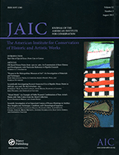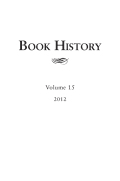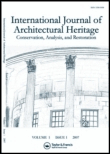
JOURNAL OF THE AMERICAN INSTITUTE FOR CONSERVATION
Scope & Guideline
Championing Excellence in Conservation Science.
Introduction
Aims and Scopes
- Interdisciplinary Conservation Techniques:
The journal emphasizes the integration of various scientific disciplines such as chemistry, physics, and materials science in the development and application of conservation techniques. - Preservation of Cultural Heritage:
A core aim is the preservation of diverse cultural artifacts, including paintings, sculptures, textiles, and historical documents, through innovative conservation methods. - Sustainability in Conservation:
The journal highlights sustainable practices in conservation, advocating for environmentally responsible methods and tools that minimize ecological impact. - Ethical Considerations in Conservation:
It addresses the ethical dimensions of conservation work, including the implications of treatment decisions and the importance of preserving the integrity of artifacts. - Education and Professional Development:
The journal serves as a resource for education and training within the conservation community, sharing insights on best practices, case studies, and advancements in conservation science.
Trending and Emerging
- Sustainability and Environmental Impact:
There is an increasing focus on sustainability tools and practices in conservation, reflecting a broader societal concern for environmental impact and the need for responsible stewardship of cultural heritage. - Diversity and Inclusion in Conservation:
Recent discussions emphasize the importance of diversity and inclusion within the conservation field, addressing systemic issues and advocating for broader representation in conservation practices. - Technical Innovation in Conservation:
The integration of advanced technologies, such as imaging techniques and material analysis, is becoming a key trend, enhancing the precision and effectiveness of conservation treatments. - Interdisciplinary Collaboration:
Emerging themes in conservation highlight the importance of collaboration across disciplines, such as art history, archaeology, and science, to enrich conservation practices and outcomes. - Contemporary Art Conservation:
There is a notable increase in research focused on the challenges and methodologies for conserving contemporary art, reflecting the evolving nature of artistic practices and materials.
Declining or Waning
- Traditional Conservation Methods:
There appears to be a reduced emphasis on traditional conservation methods, as the field shifts towards more innovative and scientifically rigorous approaches. - Historical Artifacts Conservation Exclusivity:
While historical artifacts remain important, there seems to be a declining focus on their conservation alone, with a growing interest in contemporary art and modern materials. - Generalized Ethical Frameworks:
Discussions around ethics are becoming more nuanced and specific, moving away from generalized ethical frameworks towards context-specific considerations in conservation practice.
Similar Journals

California Fish and Wildlife Journal
Connecting Science and Policy for a Greener FutureCalifornia Fish and Wildlife Journal, published by the California Department of Fish and Wildlife, is a pivotal platform dedicated to advancing the understanding of fish and wildlife management and conservation. As an open access journal, it fosters collaboration and knowledge sharing among researchers, practitioners, and students interested in aquatic and terrestrial ecosystems. With a focus on empirical research, policy implications, and innovative conservation strategies, the journal plays a crucial role in informing both scientific communities and decision-makers alike. Researchers seeking to contribute to critical discussions on sustainability, habitat preservation, and biodiversity will find this journal an essential resource. The journal’s commitment to disseminating knowledge about California's rich natural resources enhances its stature in the field of wildlife management and conservation studies.

Book History
Advancing the discourse on books as cultural artifacts.Book History is a pivotal academic journal published by Johns Hopkins University Press that delves into the rich and intricate narratives surrounding the book as a cultural artifact and form of communication. With its ISSN 1098-7371 and E-ISSN 1529-1499, this journal fosters interdisciplinary discourse across the fields of history, conservation, and library and information sciences, as evidenced by its solid standing in 2023’s Scopus rankings: 540th in Arts and Humanities (History), 48th in Arts and Humanities (Conservation), and 189th in Social Sciences (Library and Information Sciences). The journal operates under a Q2 ranking in History and Q3 in Conservation and Library and Information Sciences, making it a key resource for scholars and students alike. Dedicated to advancing the study of the book's multifaceted role in society from 2019 to 2023, it provides insightful research articles, reviews, and thematic explorations that contribute to our understanding of literary production, dissemination, and preservation. Although it does not provide open access options, its contributions are invaluable to the academy, enriching the scholarly conversation around books and their historical significance.

International Journal of Architectural Heritage
Where Heritage Meets Innovation in Architecture.The International Journal of Architectural Heritage is a premier publication dedicated to the multidisciplinary fields of architecture, conservation, and visual arts. Published by TAYLOR & FRANCIS INC, this journal serves as a vital platform for scholars and practitioners who aim to advance knowledge in the preservation of cultural heritage and architectural innovation. With an impressive impact factor reflecting its critical acclaim, including rankings in the top quartile (Q1) across multiple categories in 2023, the journal is recognized as a key resource in Arts and Humanities, particularly in Visual Arts and Performing Arts and Conservation. Since its inception in 2007, the journal has consistently provided rigorous peer-reviewed research, offering enriching insights and fostering collaborations amongst students, researchers, and professionals committed to the future of architectural heritage. As it continues to influence the field through its diverse and impactful contributions, readers can expect to engage with leading-edge studies that not only illuminate current trends but also inspire innovative practices in safeguarding architectural legacies.

Loggia Arquitectura & Restauracion
Innovating Restoration Practices for a Sustainable FutureLoggia Arquitectura & Restauracion is a pivotal academic journal dedicated to the fields of architecture, conservation, and the visual arts, published by UNIV POLITECNICA VALENCIA, EDITORIAL UPV in Spain. With an ISSN of 1136-758X and an E-ISSN of 2444-1619, this Open Access journal has been providing a platform for scholarly discussions since 1996, enhancing the global dialogue on architectural methods and restoration practices. Boasting a Q3 ranking in both Architecture and Conservation, along with a Q2 ranking in Visual Arts and Performing Arts, the journal reflects a commitment to academic rigor and innovation, as it navigates the convergence of these important fields from 2019 to 2024. The research published in Loggia addresses critical contemporary issues, enriching the knowledge base for academics, practitioners, and students alike. With a current Scopus rank that situates it within the competitive landscape of arts and humanities, Loggia serves as a vital resource for those seeking to explore the intersection of culture, history, and sustainability in architectural practice.

Egyptian Journal of Archaeological and Restoration Studies
Advancing Knowledge in Cultural Heritage Preservation.Welcome to the Egyptian Journal of Archaeological and Restoration Studies, a vital resource for scholars and practitioners in the field of archaeology and restoration. Published by the renowned SOHAG UNIV PUBLICATION CENTER-SUPC, this journal aims to disseminate cutting-edge research that illuminates the rich archaeological heritage of Egypt and beyond. With ISSN 2090-4932 and E-ISSN 2090-4940, this journal showcases innovative methodologies and interdisciplinary approaches, significantly contributing to our understanding of cultural heritage preservation. The journal's growing influence is reflected in its Q3 ranking in multiple categories, including Archaeology, Conservation, and Cultural Studies as of 2023, alongside its noteworthy placement within the Social Sciences. Open access options provide wider accessibility to essential studies, making it an indispensable tool for researchers, professionals, and students alike. Join us in exploring the past and shaping the future of archaeological scholarship.

Portal-Godisnjak Hrvatskog Restauratorskog Zavoda
Exploring New Horizons in Visual Arts Conservation.Portal-Godisnjak Hrvatskog Restauratorskog Zavoda is an esteemed academic journal dedicated to the fields of conservation and visual arts, published by the HRVATSKI RESTAURATORSKI ZAVOD. With its ISSN 1847-9464 and E-ISSN 1848-6681, this journal plays a critical role in disseminating pioneering research and facilitating discourse among scholars, practitioners, and students alike in Croatia and beyond. Although it currently does not operate on an open access model, the journal is recognized for its quality, evident in its Q3 ranking in Conservation and Visual Arts and Performing Arts categories as of 2023. With a focus on innovative techniques and case studies, Portal-Godisnjak contributes significantly to the body of knowledge and best practices in the conservation of cultural heritage. Its commitment to advancing the field is further highlighted by its engagement with contemporary conservation challenges and artistic preservation. The journal stands as an important resource for those invested in the stewardship and enhancement of our shared cultural legacy.

Conservar Patrimonio
Connecting Researchers and Practitioners in Cultural Heritage.Conservar Patrimonio is a leading academic journal dedicated to the fields of conservation and museology, published by the ASSOC PROFISSIONAL CONSERVADORES-RESTAURADORES PORTUGAL. Established as an open access platform since 2005, it aims to disseminate high-quality research and innovations essential for the preservation of cultural heritage. With an impressive 2023 impact factor, Conservar Patrimonio holds a Q2 ranking in Conservation and a Q1 ranking in Museology, reflecting its significant contribution to both disciplines. The journal is indexed amongst the top 30% of publications in the Museology category and offers valuable insights into the methodologies and practices that shape the conservation of cultural artifacts. Researchers, professionals, and students are encouraged to engage with the latest findings, case studies, and theoretical explorations presented in this esteemed journal based in Portugal, enhancing the global dialogue on conservation practices.

Global Ecology and Conservation
Championing innovative solutions for environmental challenges.Global Ecology and Conservation, published by Elsevier, stands as a premier open-access journal dedicated to advancing the field of ecology and conservation science. Since its inception in 2014, the journal has facilitated the dissemination of high-quality research, fostering critical dialogue on ecosystem management, biodiversity preservation, and sustainability practices across the globe. With a remarkable ranking within the top quartiles (Q1) in various categories including Ecology, Evolution, Behavior and Systematics, and Nature and Landscape Conservation, it is positioned among the leading resources for researchers and professionals alike. The journal has garnered a notable impact, ranking #65 out of 721 in Ecology, and houses articles that are vital to understanding and addressing the pressing environmental challenges of our time. Available in an open-access format, researchers can freely access and share vital findings, promoting a collaborative approach to ecological research. Global Ecology and Conservation is not just a publication; it is a critical tool for innovation and advocacy in conservation, poised to inspire the next generation of environmental stewards.

International Journal of Intangible Heritage
Exploring the Depths of Cultural Legacy.The International Journal of Intangible Heritage, published by the NATL FOLK MUSEUM KOREA-NFMK, stands as a premier platform dedicated to the exploration and preservation of intangible cultural heritage. With an ISSN of 1975-3586 and an E-ISSN of 1975-4019, this journal has successfully carved a niche in the fields of Conservation, Cultural Studies, and Museology, achieving Q1 categorization across these disciplines in 2023. It ranks impressively in Scopus, being #17/83 in Museology and #33/103 in Conservation, highlighting its significant contribution to the academic discourse in these fields. Published in South Korea, this journal not only serves as a vital resource for researchers and professionals but also engages students aspiring to enhance their understanding of intangible heritage. Accessible without an open access model, it features a blend of scholarly articles, reviews, and case studies from 2011 through 2024, making it a robust repository for current and emerging practices in the safeguarding of cultural expressions. By fostering innovative dialogue among scholars and practitioners globally, the International Journal of Intangible Heritage plays a crucial role in the ongoing dialogue surrounding the value and significance of intangible cultural assets.

International Journal of Conservation Science
Pioneering Research for a Sustainable TomorrowThe International Journal of Conservation Science, published by the Romanian Inventors Forum, is a premier, Open Access journal dedicated to advancing the field of conservation science since its foundation in 2010. With a strong emphasis on interdisciplinary research, the journal welcomes contributions that explore innovative methodologies and sustainable practices in conservation. Based in Romania, the journal boasts an impact factor that positions it as a leading voice in its field, reflected by its Q1 ranking in Conservation and notable placements within its categories in Scopus. With coverage spanning diverse areas from natural resource management to environmental education, the journal serves as a crucial platform for researchers, policymakers, and practitioners aiming to drive impactful conservation strategies globally. The International Journal of Conservation Science not only enhances the visibility of significant research but also promotes open dialogue and collaboration among professionals committed to preserving our natural heritage.